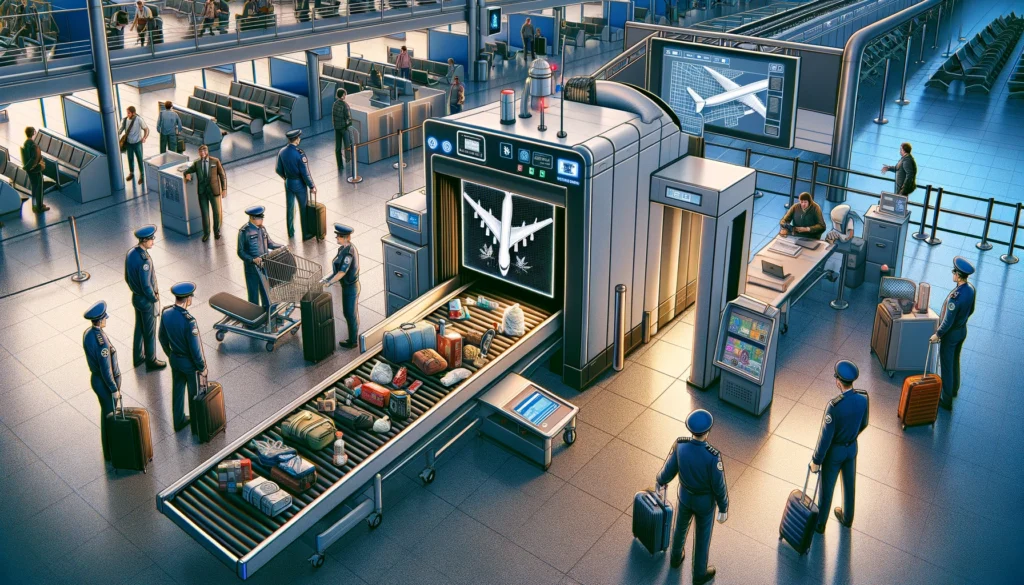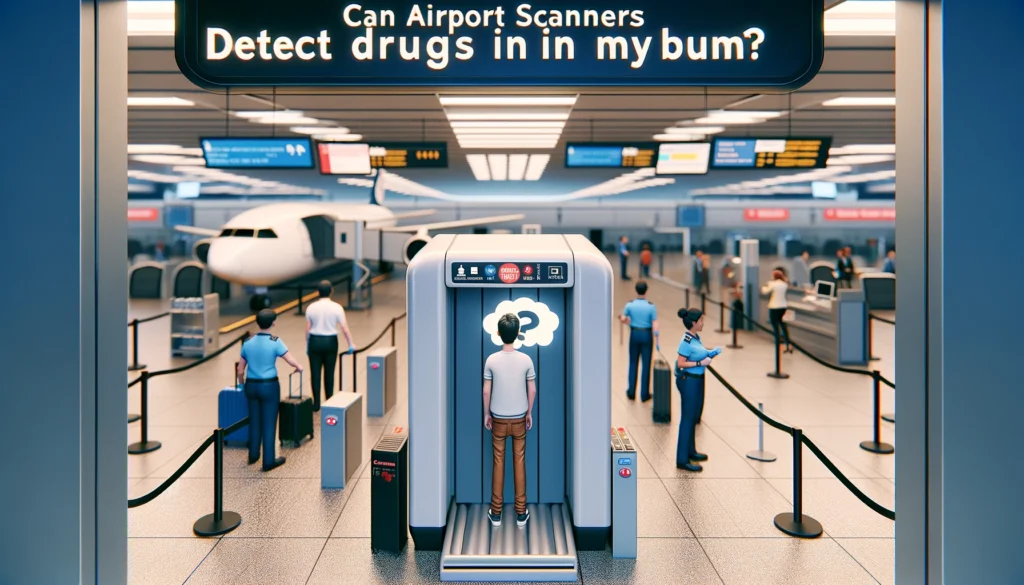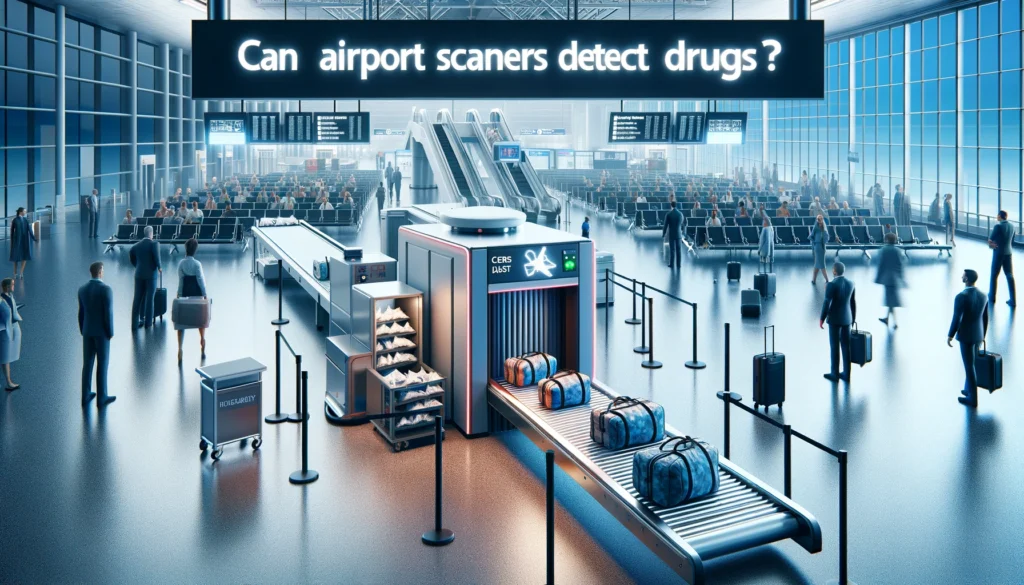The global web of air travel ensures that millions of passengers are lifted off each day towards their next destination, carrying with them their dreams, histories, and, in some cases, their worst scenarios. Moreover, Today’s crucial question is, can airport scanners detect drugs or can airport scanners detect drugs in my bum, for those who have ever thought of hiding illegal staff inside their body or in the private hidden parts of their body?
The labyrinth of airport security is as complex as critical, with its algorithms and hardware, giving outstanding security layers to all Air terminals worldwide. This outstanding layer of security at the airport can clear your curiosity with the question “Can airport scanners detect drugs “, but there’s a catch. Let’s have a deeper look into this matter.
Peering into the Science of Detection: Can Airport Scanners Detect Drugs
Regarding airport security, the typical image is that of individuals passing through metal detectors or having their luggage zapped by X-ray machines. The silent sentinels of these security checkpoints, however, hold secrets of their own that are worth exploring.
The Limitations of Current Scanning Technology
Besides, Existing full-body scanners, or millimeter wave scanners, operate on a technology that essentially peels back the traveler’s full body examination, unveiling any illegal staff that may be concealed under clothing.

These devices are adept at distinguishing non-metallic objects, like ceramics, plastics, and perhaps a piece of chocolate, that may get left in your pocket, as they are not fully infallible. The greatest challenge lies not in their technology but in their interpretation.
When detecting drugs, the key lies in the substance’s density and atomic number. Moreover, Drugs like heroin and cocaine fall into the category of low atomic number and other non-metallic substances, which can pose a challenge for detection. Concealment methods, such as those used to hide inside the human body, further complicate the detectors. The scanners are not designed to penetrate flesh, so they merely skitter across the skin, unable to reveal the secrets.
Can You Bring Pepper Spray on a Plane ? “Important Info You Need to Know!”
Future Innovations in the Fight Against Drug Trafficking:
The eyes of innovation are never still, and neither are those of airport security. Advanced Artificial Intelligence and imaging technology could present a more precise, literal, symbolic image when brokering the battle against drugs in the air.
AI and the Future of Enhanced Scanning:
AI-assisted image interpretation may be the next step forward. Algorithms can be trained to recognize the specific analytics required to differentiate drugs from human tissue. Moreover, with this, potentially more intrusive scanning technologies are in early developmental stages, hinting towards a compelling future for drug detection.
Lidar, for example, represents a quantum jump in scanning potential. This technology utilizes lasers to map the environment in three dimensions precisely. The ability to scan through the folds of human concealment without causing harm or offense to the human body, & that’s a DMZ that sorts in the medico-legal minefield of privacy and security.
Can Airport Scanners Detect Drugs: Limitations and Loopholes:
Despite our technological might, the human body remains a sanctuary that airport scanners have yet to fully penetrate. Moreover, The acts of swallowing balloons filled with drugs or the surgical implantation in bodies challenge the airport security protocols. Evasion tactics can be as crude as a suspect shifting substances to the back of their throat, right before the most telltale scans are performed.
LA Airport Smoking Lounge “Where to Smoke at LAX Now!”
The Human Factor in Security:
For all the algorithms and intricate software at play, The human factor presents the most significant vulnerability. Scanners in the end are technological machines & there’s always a chance of loopholes in technology.
So there is always a team of special agents & anti-narcotics team present at the terminal to ensure that no illegal substance makes its way out of their terminal boundary. And if you ever get your escape from the Detectors and scanners, then don’t be happy because you just bypassed one layer of security, special agents at airports are well-trained, and escaping from them is near to impossible job.
Can airport scanners detect drugs in my bum?
Maybe or maybe not..!! Utilization of advanced state-of-the-art imaging technology by airport security, which includes millimeter-wave scanners and backscatter X-ray systems, is a good remedy for identifying objects that are underneath the skin’ surface or skimming along. The remarkable capabilities of these machines are connected with the expertise of their operators.
Can You Bring Lighters On Planes? “Find Out Now!”

While this scanning technique is great for discouraging external items that are present in your clothes, body & luggage, it is circumvention when it comes to looking for drugs that have been hidden in the ass. The modern scan machines generate highly precise models of the body’s exterior anatomy, however, they aren’t constructed to reach into the inner hollow cavity parts and detect them, thus narrowing the scan ability of these machines to detect only the outer system components.
Therefore, even though these machines massively advance facilities and objectives of security by detecting a large range of other items that are not intended to be concealed, their powers of discovery of the hidden substance within the deprived body depth are limited, Thus, they rely on other types of intelligence and security protocols in case the necessary invasion is needed.
Body cavity smuggling, like hiding something in your bum, is an unfortunate reality, and falls well outside the domain of most airport scanners.
Airport Body Scanners: The Ultimate Guide to Your Privacy & Security
Airport Scanners: Privacy at What Cost?
The push for enhanced scanning capabilities brings into question the right to privacy, physical autonomy, and the potential psychological effects of more invasive screenings.
These discussions are not merely academic; they are a moral compass pointing north in a digital age where the line between the individual and the ubiquitous gaze of technology is increasingly blurred.
How to Travel with Serum Eye Drops “Find Out Now!”
Protecting Rights in the Security Clearance
Travelers, too, must be versed in the intricate choreography of airport security, understanding and protecting their rights even in the most scrutinizing of screenings.
- Know Your Rights and the Scanner’s Limits
Understanding airport scanners’ capabilities and limitations gives the frequent flier an improved sense of what’s at stake during screenings. Organizations such as the Transportation Security Administration (TSA) publish guidelines, rights, and protocols that serve as valuable passenger tools.
- The Backbone of Legal Support
In the case of a false or positive detection, legal recourse is an indispensable ally. Travelers who find themselves unjustly under the lens of suspicion due to misinterpretation or overreach of security scanners should not hesitate to seek legal assistance. This defense ensures that security protocols remain rooted in the foundational principle of the rule of law.
A strategic alliance with legal counsel specializing in aviation security could provide previously overlooked angles of approach for travelers who find themselves in legal or personal difficulties due to airport security protocols.
Airport of Future “Witness The Tomorrow’s Tech Now!”
The Uphill Struggle Against Airborne Narcotics:
Finally, we arrive at the core of the matter, can airport body scanners detect drugs in my bum? or concealed in any other part of the human body? This stimulates an image of certain uncertainty, the answer is surrounded by doubt.
With the evolution of technology and a concerted effort to maintain a focus on ethics and individual rights, the possibility for airports to detect drugs hidden within the human body is increasing.
Irrespective of future technological advancements, the quest to strike the perfect balance between security and individual liberty will always be a work in progress.
Chances of Plane Crash: Astonishing Truths That Will Shock You!

